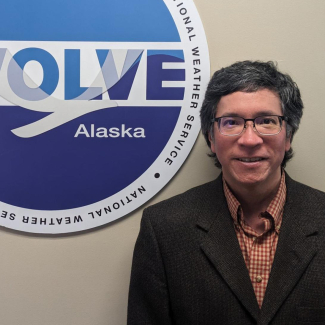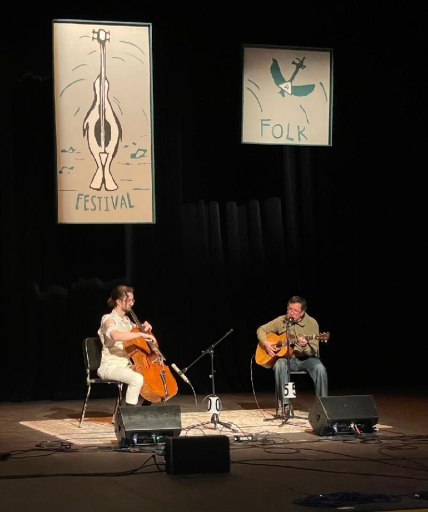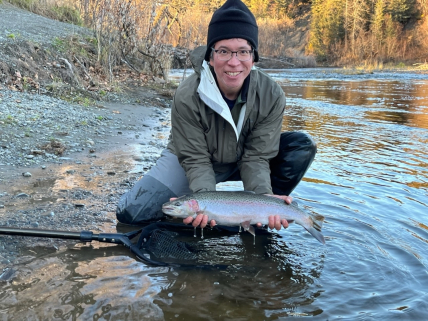
Peter Chan
National Weather Service
Location: Anchorage, Alaska
Office: Emergency Services & Multimedia Branch
Job Title: Communications & Multimedia Specialist
Educational Background:
- Bachelor of Science in Meteorology from the University of Wisconsin, Madison
- Certified Broadcast Meteorologist (CBM) and Certified Consulting Meteorologist (CCM) with the American Meteorological Society
Describe the career path that led you to your current job with the National Weather Service.
- High school and college internships with the local NWS office and TV stations in Grand Rapids, MI, long before such opportunities were commonplace
- Established the weather department at WOOD Radio in Grand Rapids as the only full-time, on-staff radio meteorologist in the State of Michigan
- Weekend TV meteorologist and science education reporter for WWMT 3 in Kalamazoo, MI
- Entered the NWS to establish the modernized WFO in Grand Rapids, where I became a forecaster and marine weather focal point
- Founded the weather department as chief meteorologist of WXMI FOX 17
- AMS Certified Consulting Meteorologist with an emphasis on forensic meteorology and science education
- Re-entered the NWS at WFO Elko, NV, as a forecaster and social media focal point
- NWS Alaska Region Emergency Services & Multimedia Branch, Communications and Multimedia Specialist
What do you do for the NWS?
- I lead a multimedia program that produces daily video segments for Alaska’s aviation, marine, and general statewide weather and then shared on YouTube. Our primary goal is to reach the underserved people and communities in rural Alaska off of the main road system. We also record a daily radio segment for NPR and occasionally help other NWS units produce special videos, such as the Alaska Pacific River Forecast Center during river breakup in the spring. I also serve as an Emergency Response Specialist in the Regional Operations Center and have training as a Public Information Officer.
What was the most interesting, exciting, or impactful weather/water event you experienced while working for the NWS and why does it stand out?
- WFO Grand Rapids, MI – forecasting hurricane-force winds and waves over 20 feet on Lake Michigan in November 1998 for a “bomb cyclone” similar to the historic storm that sank the Edmund Fitzgerald on Lake Superior in 1975.
- WFO Elko, NV – record spring floods of 2017 followed by the epic wildfire season of 2018 across northern Nevada and much of the West.
- Alaska ROC, Anchorage, AK – deployed to the State EOC in the fall of 2022 after extra-tropical Typhoon Merbok struck western Alaska.
What made you decide to pursue a career with the NWS?
- Something I never shared before – Back in grade school, when there was no internet and the NWS was still using teletypes, I would listen to NOAA Weather Radio during severe weather and then quickly make large handwritten warning signs and tape them to the front picture window of my house for the neighborhood to see. How could I not end up working for the NWS???
What do you like most about working for the NWS?
- I like to tell the weather story. I enjoy the challenges and camaraderie of working as a team in a dynamic operational environment where we apply ourselves using science and technology in the service of others.
What advice do you have for someone interested in a career with the NWS?
- The notion of a traditional career is fading fast. Rapid advances in technology and economic forces will reshape the weather enterprise beyond what we currently anticipate. This will create new, yet-to-be-defined job positions and opportunities as the NWS evolves. Remain curious, open, and flexible.
What training or coursework would you recommend to someone interested in following your career path?
-
Meteorologists of the evolving NWS will increasingly need to be superordinate communicators. In addition to possessing a high degree of core knowledge from formal coursework and training, the delivery of products and services will require a fluency in all forms of communication (verbal, written, and visual) guided by a high degree of emotional intelligence. This communication will also require improved data visualization and infographic design, and the use of more efficient delivery platforms for briefings and whatever form social media interaction takes.
Beyond the available communications courses and internships, I would encourage anyone to explore and develop means of creative expression. Gain experience in the performing and/or visual arts. It helps to build confidence and can enhance perception.
Anything else you want to share?
- Celebrate “the poetry of place” where you live and visit, wherever your journey leads. Acknowledge the people, plants, and animals around you and the surrounding land, water and skyscapes.




